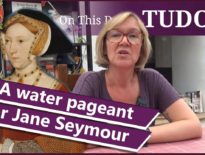On this day in Tudor history, 6th June 1549, an army of rebels assembled at Bodmin in Cornwall, and there was a town meeting in which the rebels' demands were put forward.
What were these rebels rebelling against?
The recent religious changes, particularly the new law concerning the Book of Common Prayer.
Trouble ensued and their grievances became a full-blown rebellion, the Prayer Book Rebellion. You can find out what happened next and how the rebellion ended in today's talk.
Other videos on the Prayer Book Rebellion:
Also on this day in Tudor history, 6th June 1522, Holy Roman Emperor Charles V and King Henry VIII made a grand entry into the city of London. Find out more about the pageantry involved in last year’s video:
Also on this day in history:
- 1527 – Probable date for burial of Henry Algernon Percy, 5th Earl of Northumberland, in Beverly Minster.
- 1556 – Birth of Edward la Zouche, 11th Baron Zouche, at Harringworth, Northamptonshire. He was the only son of George la Zouche, 10th Baron Zouche of Harringworth, and his wife, Margaret. Zouche was a landowner, diplomat and member of James I's Privy Council.
- 1563 – Baptism of Robert Cecil, only son of William Cecil, 1st Baron Burghley, and his wife, Mildred, at St Clement Danes, Strand.
- 1597 – Death of William Hunnis, musician and conspirator. He was Master of the Children of the Chapel (royal) in Elizabeth I's reign. He was imprisoned in 1556 in the Tower of London after being involved in a plot to rob the treasury, and was released when Elizabeth I became Queen.
- 1605 – Playwright William Haughton made his will and died in the next couple of days. His plays included "Englishmen for my Money, or, A Woman will Have her Will", "Patient Grissil" and "Grim the Collier of Croydon, or, The Devil and his Dame", and he wrote or co-wrote many more.
- 1618 – Death of Sir James Lancaster, merchant and Director of the East India Company, in London. He was buried in All Hallows, London Wall.
Transcript:
On this day in Tudor history, 6th June 1549, an army of rebels assembled at Bodmin in Cornwall, and Mayor Bray convened a town meeting where resolutions were put containing the demands of the rebels who were against the introduction of the new “Book of Common Prayer”. This led to the famous Prayer Book Rebellion of Edward VI’s reign. Among those present at the meeting in Bodmin on this day in 1549 was Humphrey Arundell of Helland in Cornwall, an experienced solider, who became leader of the Cornish forces in the Prayer Book Rebellion.
The Prayer Book Rebellion took place in the south-west of England, a predominantly Catholic area, in the summer of 1549. Henry VIII, Edward VI's father and the previous monarch, had broken with Rome in the 1530s and had been declared the Supreme Head of the Church in England. Although Henry had died a Catholic, the break had brought religious changes to the country and these had become more Protestant when his young son came to the throne.
In 1549, the Book of Common Prayer, which had been composed mainly by Archbishop Thomas Cranmer and which was the official liturgy of Edward VI's Protestant Church, was introduced into England. The Act of Uniformity, which was passed in January 1549, made it illegal for parish priests to use Latin liturgical rites from Whitsunday, 9th June, that year. Instead, they had to use the Book of Common Prayer, which was in English. This change from Latin to English, from the centuries’ old way of celebrating mass to celebrating it in English, wasn't embraced by all of the English people and in the summer of 1549, there was trouble in Devon and Cornwall due to poor economic conditions combined with the unpopularity of the religious changes of the last 15 years or so. In Cornwall and Devon, the English language just wasn’t spoken by the majority of the people, so to be compelled to have services in this unfamiliar language was awful for them.
The rebels called for the rebuilding of abbeys, the restoration of the Six Articles, the restoration of prayers for souls in purgatory, the policy of only the bread being given to the laity and the use of Latin for the mass.
At Sampford Courtenay on Whitmonday 1549, the parishioners managed to persuade their parish priest to revert to the Latin Catholic service, saying “we will not receive the new service because it is but like a Christmas game”. It wasn’t just that the service was in English, there was no Withsunday procession in the church and no elevation of the host. It was all so foreign to them and they wanted the old ways back. Of course, the old way of doing things was against the law, so local justices arrived for the next service to compel the priest to use the Book of Common Prayer. Trouble broke out and local farmer, William Helyons, who supported the new way, was killed when he was struck with a bill hook on the neck and attacked with further blows.
Following this outbreak of violence, many of the local men made their way to Crediton where other rebels were gathering, to join forces and march on Exeter. There, it is thought that they also met with the Cornish rebels, who were under the command of Humphrey Arundell. The rebels’ resolved was strengthened when, after they refused to negotiate with men like Sir Peter Carew sent by Lord Protector Somerset, Carew and his men set fire to a barn in which some of the rebels had taken position.
On 2nd July 1549, the rebels marched on to Exeter, under the banner of the five wounds, which had been used in the Pilgrimage of Grace rebellion, and laid siege to the city, a siege which would last for 5-6 weeks.
The Prayer Book Rebellion saw several clashes between the rebels and Crown forces - The Battle of Fenny Bridges, The Battle of Woodbury Common, The Battle of Clyst St Mary, The Battle of Clyst Heath, the relief of Exeter, which ended the siege, and then the final battle on the 17th August 1549, the Battle of Sampford Courtenay, which saw those rebels who’d survived the Battle of Clyst Heath being routed by the Crown forces. Many hundreds of rebels were killed and surviving rebel leaders were captured, including Humphrey Arundell, who was imprisoned in Rougemont Castle in Exeter and then the Tower of London, before being tried and condemned for high treason and executed in January 1550.



I loved this video Claire, since I was born in Exeter and brought up in a nearby village, Ide. My brother and I cycled to many of the places mentioned in the video. I must look more into this period of Tufor history, as it fascinates me that my fellow Devonians, normally placid folk, could be so enraged by the new prayer book. Well done, m’dears, I say.